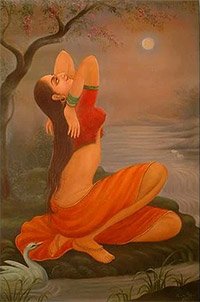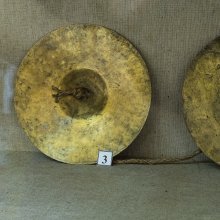Vadya, Vādya: 24 definitions
Introduction:
Vadya means something in Buddhism, Pali, Hinduism, Sanskrit, the history of ancient India, Marathi, Hindi. If you want to know the exact meaning, history, etymology or English translation of this term then check out the descriptions on this page. Add your comment or reference to a book if you want to contribute to this summary article.
Alternative spellings of this word include Vady.
Images (photo gallery)
(+1 more images available)
In Hinduism
Natyashastra (theatrics and dramaturgy)
Source: Wisdom Library: Nāṭya-śāstraVādya (वाद्य) is a Sanskrit technical term referring to “instrumental music”, according to the Nāṭyaśāstra chapter 28. It is also known as Ātodya.

Natyashastra (नाट्यशास्त्र, nāṭyaśāstra) refers to both the ancient Indian tradition (shastra) of performing arts, (natya—theatrics, drama, dance, music), as well as the name of a Sanskrit work dealing with these subjects. It also teaches the rules for composing Dramatic plays (nataka), construction and performance of Theater, and Poetic works (kavya).
Purana and Itihasa (epic history)
Source: Wisdom Library: Padma-puranaVādya (वाद्य) refers to “(pleasing) musical instruments” and is used in the worship of Gaṇeśa, according to the Padmapurāṇa 1.65 (“The Slaying of Kālakeya”).—Accordingly, as Vyāsa said:—“[...] The king is not angry with him; plague does not occur in his house; he does not feel the dearth (of anything); he does not suffer from weakness after (i.e. due to his) having worshipped Gaṇeśa. ‘(My) salutation to the chief of the Gaṇas, who removes all difficulties, who was worshipped even by gods for accomplishing their desired objects’. The sacred formula is: ‘Om, salutation to Gaṇapati’. He, who would worship the protector of the Gaṇas, with flowers dear to Viṣṇu, and other fragrant flowers, with modakas, fruits, roots and other seasonal things, with curds and milk, pleasing musical instruments [i.e., vādya—priyairvādyairapi], and with incense and (other) fragrant (objects) obtains success in all undertakings. [...]”.
Source: archive.org: Nilamata Purana: a cultural and literary studyVādya (वाद्य) is a general name for “musical instruments” that existed in ancient Kashmir (Kaśmīra) as mentioned in the Nīlamatapurāṇa.—The Nīlamata says that the land of Kaśmīra was thronged with ever-sportive and joyful people enjoying continuous festivities. Living amidst scenes of sylvan beauty they played, danced and sang to express their joys, to mitigate their pains, to please their gods and to appease their demons.
Source: archive.org: Shiva Purana - English TranslationVādya (वाद्य) refers to “musical instruments”, according to the Śivapurāṇa 2.3.7.—Accordingly, after the Goddess (Umā/Śivā) incarnated as Pārvatī by becoming the daughter of Menā:—“[...] The lord of mountains rejoiced on seeing the child shining in dark splendour like that of the blue lotus. All the citizens there, both men and women, rejoiced much. There were great festivities. Different sorts of musical instruments [i.e., vādya] were played. Auspicious songs were sung. The dancing girls exhibited their saltatorial skill. The lord of mountains performed post-natal sacred rites and made charitable gifts to the Brahmins. [...]”.
Source: Cologne Digital Sanskrit Dictionaries: The Purana IndexVādya (वाद्य).—Names of musical instruments mentioned.*
- * Brahmāṇḍa-purāṇa IV. 16. 3-6; Matsya-purāṇa 7. 14; 105. 6.

The Purana (पुराण, purāṇas) refers to Sanskrit literature preserving ancient India’s vast cultural history, including historical legends, religious ceremonies, various arts and sciences. The eighteen mahapuranas total over 400,000 shlokas (metrical couplets) and date to at least several centuries BCE.
Shaivism (Shaiva philosophy)
Source: Shodhganga: Temple management in the ĀgamasVādya (वाद्य) refers to “playing musical instruments” (specific tāla during certain rituals) and represents one of the various upacāras (offerings), in pūjā (ritual worship), as defined in the Śaivāgamas.—Pūjā consists of offering hospitality, in the form of water to wash the feet, to drink, water for ablutions, offering a bath, new clothes, fragrant unguents, fragrant flowers and ornaments, food and so on. Each step in the pūjā process is called “saṃskāra” and each offering is called “upacāra” [viz., Vādya].

Shaiva (शैव, śaiva) or Shaivism (śaivism) represents a tradition of Hinduism worshiping Shiva as the supreme being. Closely related to Shaktism, Shaiva literature includes a range of scriptures, including Tantras, while the root of this tradition may be traced back to the ancient Vedas.
Kama-shastra (the science of Love-making)
Source: Shodhganga: Elements of Art and Architecture in the Trtiyakhanda of the Visnudharmottarapurana (kama)Vādya (वाद्य) or “instrumental music” refers to one of the “sixty four kinds of Art”, according to the Kāmasūtra of Vātsyāyaṇa.—Indian tradition, basically includes sixty four Art forms are acknowledged. The references of sixty four kinds of kalā are found in the Bhāgavatapurāṇa, Śaiva-Tantras, Kāmasūtra of Vātsyāyaṇa etc.

Kamashastra (कामशास्त्र, kāmaśāstra) deals with ancient Indian science of love-making, passion, emotions and other related topics dealing with the pleasures of the senses.
Sports, Arts and Entertainment (wordly enjoyments)
Source: archive.org: Syainika Sastra of Rudradeva with English Translation (art)Vādya (वाद्य) refers to “instrumental music”, and represents one of the eighteen Addictions or Vices (vyasana) which are to be practised within proper bounds for the delight of the enjoyments of the world, according to the Śyainika-śāstra: a Sanskrit treatise dealing with the divisions and benefits of Hunting and Hawking, written by Rājā Rudradeva (or Candradeva) in possibly the 13th century.—Accordingly, “[...] It has been said that there are eighteen addictions. These are the outcome of the desire for earthly enjovments. [...] In works on music, instrumental music (vādya) said to be of four kinds, such as tata or stringed instruments, and so forth. The object of dancing and instrumental music is the same as that of vocal music. [...]”.

This section covers the skills and profiencies of the Kalas (“performing arts”) and Shastras (“sciences”) involving ancient Indian traditions of sports, games, arts, entertainment, love-making and other means of wordly enjoyments. Traditionally these topics were dealt with in Sanskrit treatises explaing the philosophy and the justification of enjoying the pleasures of the senses.
General definition (in Hinduism)
Source: Google Books: Fine Arts in Ancient IndiaVādya (वाद्य, “instrumental music”).—The second important branch of fine arts is “vādya” or popularly known as Instrumental Music. There are more or less four important categories of musical instruments.
These are known as
- Tata (string instruments),
- Suṣira (blowing instruments),
- Ānaddha or Avanaddha (leather-covered instruments)
- Ghana (instruments made of metal, wood, stone or clay).
In Buddhism
Mahayana (major branch of Buddhism)
Source: Wisdom Library: Maha Prajnaparamita SastraVādya (वाद्य) refers to “music”, according to Mahāprajñāpāramitāśāstra (chapter 15).—Accordingly, “[...]Actually, [even while he speaks], the Buddha is not disturbed and is always resting in samādhi; but as a result of his merits acquired in earlier existences, he utters sounds and answers in the manner of an echo. Like a heavenly musical instrument that emits sounds automatically, like a precious stone that automatically gives people everything they desire in the way of clothing, food or music (vādya), the Buddha speaks automatically through all the pores of his body and preaches the Dharma according to the wishes [of his listeners] without any action, thought or conception on his part. [...]”.

Mahayana (महायान, mahāyāna) is a major branch of Buddhism focusing on the path of a Bodhisattva (spiritual aspirants/ enlightened beings). Extant literature is vast and primarely composed in the Sanskrit language. There are many sūtras of which some of the earliest are the various Prajñāpāramitā sūtras.
India history and geography
Source: Cologne Digital Sanskrit Dictionaries: Indian Epigraphical GlossaryVādya.—(SITI), a musical instrument. Note: vādya is defined in the “Indian epigraphical glossary” as it can be found on ancient inscriptions commonly written in Sanskrit, Prakrit or Dravidian languages.
Source: Yale Journal of Music & Religion: Ritual Music in Contemporary Brahmanical Tantric Temples of KeralaVādya refers to “musical instruments” played during ritual processions in temples in Kerala, South India.—While Brahmans perform rituals by means of mantras and gestures (mudras), Mārārs perform rituals by means of the sound of musical instruments (vādya) and songs. Indeed, it is a fact generally accepted—by any member of the temple community, and even by devotees—that the ritual performed by the Brahman is not complete and efficacious unless at least one Mārār beats the prescribed drum phrases along with him.

The history of India traces the identification of countries, villages, towns and other regions of India, as well as mythology, zoology, royal dynasties, rulers, tribes, local festivities and traditions and regional languages. Ancient India enjoyed religious freedom and encourages the path of Dharma, a concept common to Buddhism, Hinduism, and Jainism.
Languages of India and abroad
Marathi-English dictionary
Source: DDSA: The Molesworth Marathi and English Dictionaryvadya (वद्य).—a (S) An epithet used with the word pakṣa (a lunar fortnight) and with the names (dvitīyā, tṛtīyā, caturthī &c.) of the days of the lunar fortnight, implying Dark, waning &c.
--- OR ---
vāḍyā (वाड्या).—See vāḍhapa &c.
--- OR ---
vāḍyā (वाड्या).—m C (vāḍī) A proprietor of hamlets, or enclosures, or tenements.
--- OR ---
vādya (वाद्य).—n (S) A musical instrument. See in order carmavādya, tantuvādya, maṅgalavādya, mukhavādya, raṇavādya &c.
--- OR ---
vādyā (वाद्या).—m (vāda) A disputant, an opponent in argument: also a disputatious or quarrelsome person. 2 (Vulgar.) An antagonist or opponent in general.
Source: DDSA: The Aryabhusan school dictionary, Marathi-Englishvādya (वाद्य).—n A musical instrument.
--- OR ---
vādyā (वाद्या).—Disputant. (Vulgar.) An opponent.
Marathi is an Indo-European language having over 70 million native speakers people in (predominantly) Maharashtra India. Marathi, like many other Indo-Aryan languages, evolved from early forms of Prakrit, which itself is a subset of Sanskrit, one of the most ancient languages of the world.
Sanskrit dictionary
Source: DDSA: The practical Sanskrit-English dictionaryVadya (वद्य).—a.
1) Fit to be spoken, not blamable; cf. अवद्य (avadya).
2) Dark or second (said of the fortnight of a lunar month; vadyapakṣaḥ the dark fortnigt).
-dyam Speech, speaking about.
--- OR ---
Vādya (वाद्य).—[vad-ṇic yat]
1) A musical instrument; ततं वाद्यं तु देवानां गन्धर्वाणां च शौषिरम् । आनद्धं राक्षसानां तु किंनराणा घनं विदुः (tataṃ vādyaṃ tu devānāṃ gandharvāṇāṃ ca śauṣiram | ānaddhaṃ rākṣasānāṃ tu kiṃnarāṇā ghanaṃ viduḥ) || Saṅgītadāmodara.
2) The sound of a musical instrument; श्रोत्रेषु संमूर्च्छति रक्तमासां गीतानुगं वारिमृदङ्ग- वाद्यम् (śrotreṣu saṃmūrcchati raktamāsāṃ gītānugaṃ vārimṛdaṅga- vādyam) R.16.64 (vādyadhvaniḥ Malli.).
-dyaḥ, -dyam An instrumental music.
Derivable forms: vādyam (वाद्यम्).
Source: Cologne Digital Sanskrit Dictionaries: Edgerton Buddhist Hybrid Sanskrit DictionaryVadya (वद्य).—(nt. ? = Pali vajja, which is usually derived from Sanskrit varjya, tho this is not used as a noun in this sense; if so, vadya would be a false Sanskritization of vajja, as in next), fault, sin: (read) aṇumātreṣu vadyeṣu bhaya- darśāvī Mahāvastu iii.52.1 = Pali aṇumattesu vajjesu bhayadas- sāvī (see Critical Pali Dictionary s.v. aṇumatta), seeing danger in (even) very small faults; a common phrase in Pali; since Pali vajja is common in other locutions, there seems no doubt that we must read vadyeṣu; mss. corrupt, °mātreṣevadyeṣu or °mātreṣvabandheṣu; Senart em. °mātreṣv āvadyeṣu (intending Sanskrit avadyeṣu? this would seem plausible but for the close Pali parallel).
Source: Cologne Digital Sanskrit Dictionaries: Shabda-Sagara Sanskrit-English DictionaryVadya (वद्य).—f.
(-dyā) Adj. 1. Unblamable. 2. The second or dark, (fortnight of a lunar month.) n.
(-dyaṃ) Speech, speaking.
--- OR ---
Vādya (वाद्य).—n.
(-dyaṃ) Any musical instrument. E. vad to sound, aff. ṇyat; to be sounded or played.
Source: Cologne Digital Sanskrit Dictionaries: Cappeller Sanskrit-English DictionaryVādya (वाद्य).—[adjective] to be spoken or to be played (blown) on; [neuter] speech or musical instrument.
Source: Cologne Digital Sanskrit Dictionaries: Monier-Williams Sanskrit-English Dictionary1) Vadya (वद्य):—[from vad] mfn. to be spoken etc. (See a-v and anav)
2) [v.s. ...] Name of the days of the dark lunar fortnight
3) [v.s. ...] n. speech, speaking about, conversing (See brahma-v, satya-v).
4) Vādya (वाद्य):—[from vāda] mfn. to be said or spoken or pronounced or uttered, [Aitareya-brāhmaṇa]
5) [v.s. ...] to be sounded or played (as a musical instrument), [Catalogue(s)]
6) [v.s. ...] n. a speech, [Śatapatha-brāhmaṇa]
7) [v.s. ...] instrumental music, [Mālavikāgnimitra; Kathāsaritsāgara] etc.
8) [v.s. ...] m. or n. a musical instrument, [Rāmāyaṇa; Kathāsaritsāgara; Pañcatantra]
Source: Cologne Digital Sanskrit Dictionaries: Yates Sanskrit-English DictionaryVādya (वाद्य):—(dyaṃ) 1. n. Musical instrument.
Source: DDSA: Paia-sadda-mahannavo; a comprehensive Prakrit Hindi dictionary (S)Vādya (वाद्य) in the Sanskrit language is related to the Prakrit words: Vajja, Vāia.
[Sanskrit to German]
Sanskrit, also spelled संस्कृतम् (saṃskṛtam), is an ancient language of India commonly seen as the grandmother of the Indo-European language family (even English!). Closely allied with Prakrit and Pali, Sanskrit is more exhaustive in both grammar and terms and has the most extensive collection of literature in the world, greatly surpassing its sister-languages Greek and Latin.
Hindi dictionary
Source: DDSA: A practical Hindi-English dictionaryVādya (वाद्य) [Also spelled vady]:—(nm) a musical instrument; (a) (musical instrument) that can be played upon; (fit) to be played upon; ~[vṛṃda] the orchestra; -[saṃgīta] instrumental music.
...
Kannada-English dictionary
Source: Alar: Kannada-English corpusVadya (ವದ್ಯ):—[adjective] fit to be talked about.
--- OR ---
Vadya (ವದ್ಯ):—
1) [noun] the act of talking, speaking.
2) [noun] that which is uttered, spoken; speech.
3) [noun] the second half of a lunar month in which the moon gradually grows less.
--- OR ---
Vādya (ವಾದ್ಯ):—
1) [noun] any musical instrument.
2) [noun] instumental music.
3) [noun] (math.) a symbol for the number five.
Kannada is a Dravidian language (as opposed to the Indo-European language family) mainly spoken in the southwestern region of India.
See also (Relevant definitions)
Starts with (+11): Vaadya-goshtee, Vaadya-mandal, Vaadya-sangit, Vadya-maharaja, Vadya-mandala, Vadya-sangita, Vadyabhanda, Vadyabhandamukha, Vadyadhara, Vadyadhvani, Vadyadhyaya, Vadyadvadashaka, Vadyagara, Vadyaghai, Vadyagoshthi, Vadyaka, Vadyakara, Vadyakona, Vadyamana, Vadyamanda.
Ends with (+82): Abhishavadya, Abhivadya, Abupavadya, Anabhivadya, Anaddhavadya, Anavadya, Anupavadya, Anuvadya, Aparivadya, Apavadya, Arayavadya, Areavadya, Arjunavadya, Asvadya, Avadya, Avivadya, Bahurvadya, Bahuvadya, Bhandavadya, Brahmavadya.
Full-text (+105): Vajja, Ghantavadya, Vadyabhanda, Brahmavadya, Vadyanirghosha, Satyavadya, Abhivadya, Carmavadya, Jalavadya, Udakavadya, Vaadya-sangit, Vaadya-mandal, Vaadya-goshtee, Mukhavadya, Vadyadhara, Vadyakara, Patavadya, Tantuvadya, Mangalavadya, Anuvadya.
Relevant text
Search found 33 books and stories containing Vadya, Vādya, Vāḍyā, Vādyā, Vaadya; (plurals include: Vadyas, Vādyas, Vāḍyās, Vādyās, Vaadyas). You can also click to the full overview containing English textual excerpts. Below are direct links for the most relevant articles:
Vishnudharmottara Purana (Art and Architecture) (by Bhagyashree Sarma)
4. Instrumental Music (Vādya) < [Chapter 2 - Music]
1. A Note on Music < [Chapter 2 - Music]
3. A General Note on Art < [Chapter 1 - Introduction]
Is Music a Vidya or a Kala < [Jan - Feb 1939]
The Essentials of Karnatic music < [April – June, 2004]
The Essentials of Karnatic Music < [March-April, 1929]
Shishupala-vadha (Study) (by Shila Chakraborty)
Knowledge of Music in the Śiśupālavadha < [Introduction]
Garga Samhita (English) (by Danavir Goswami)
Verse 2.19.16 < [Chapter 19 - The Rāsa-dance Pastime]
Verse 3.2.19 < [Chapter 2 - The Great Festival of Śrī Girirāja]
Verse 3.2.36 < [Chapter 2 - The Great Festival of Śrī Girirāja]
Amarakoshodghatana of Kshirasvamin (study) (by A. Yamuna Devi)
Laya (tempo) < [Chapter 4 - Cultural Aspects]
Three types of Dance < [Chapter 4 - Cultural Aspects]
Musical instruments (e.g., Stringed, Percussions, Cymbals and Wind-blown) < [Chapter 4 - Cultural Aspects]
Hari-bhakti-kalpa-latikā (by Sarasvati Thkura)





